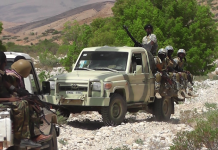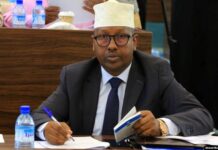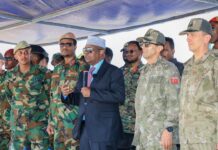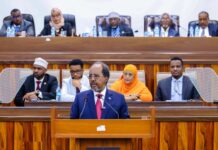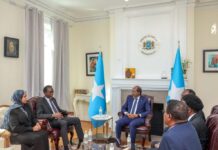Somalia and the United States have agreed to deepen military cooperation in a renewed push against extremist groups threatening stability in the Horn of Africa. The decision was reached following an extended meeting on Wednesday evening between Somali President Hassan Sheikh Mohamud, senior Somali military officials, and General Dagvin R.M. Anderson, the newly appointed commander of the United States Africa Command (AFRICOM).
Both sides resolved to strengthen joint security operations, including expanding U.S. support for the Somali National Army (SNA) through training, equipment, and sustained aerial operations targeting al-Shabaab and ISIS affiliates. The discussions also highlighted AFRICOM’s commitment to maintaining its drone strike campaign against high-value militant targets, a strategy that has intensified over the past several months.
The meeting brought together President Hassan Sheikh, Somalia’s Chief of Defense Forces, and General Anderson, who officially assumed command of AFRICOM in August. Anderson’s visit marked his first direct engagement with Somali leadership since taking office. Preceding the high-level talks, he also met U.S. diplomats, African Union Transition Mission in Somalia (ATMIS) commanders, and other security stakeholders.
The closed-door discussions took place in Mogadishu on Wednesday, September 3, and stretched late into the evening.
Somalia remains at the heart of U.S.counterterrorism strategy in East Africa. Al-Shabaab, an al-Qaeda affiliate, continues to mount deadly attacks within Somalia and across borders, while ISIS-linked fighters have increased their footprint in northern Somalia. Washington sees Somalia’s security not only as a regional priority but also as a matter of global counterterrorism, ensuring militant groups cannot project threats internationally.
Under the renewed framework, AFRICOM will expand training programs for Somali forces, provide logistical and intelligence support, and maintain direct involvement in combat operations against militants. The Somali government, for its part, committed to accelerating reforms within the national army to ensure sustainability once foreign forces, including ATMIS, scale down their presence in 2026.
The United States has maintained a long-standing military presence in Somalia, oscillating in scale over the past decade depending on U.S. administrations. In 2022, President Joe Biden redeployed hundreds of U.S. troops to Somalia after a temporary withdrawal in 2020, citing the growing threat from al-Shabaab. Since then, drone strikes and joint missions have played a central role in weakening the group’s leadership and disrupting its operations. Despite these efforts, al-Shabaab remains one of the most resilient insurgent movements in the world, with financing networks stretching beyond Somalia’s borders.
The latest commitment between Mogadishu and Washington underscores a renewed urgency in counterterrorism cooperation. While Somalia continues to rely on external partners to fill critical security gaps, the federal government insists it is determined to build a capable, self-reliant military. The question now is whether this strengthened partnership can accelerate progress against al-Shabaab and ISIS, paving the way for long-term stability in Somalia and across the Horn of Africa.


